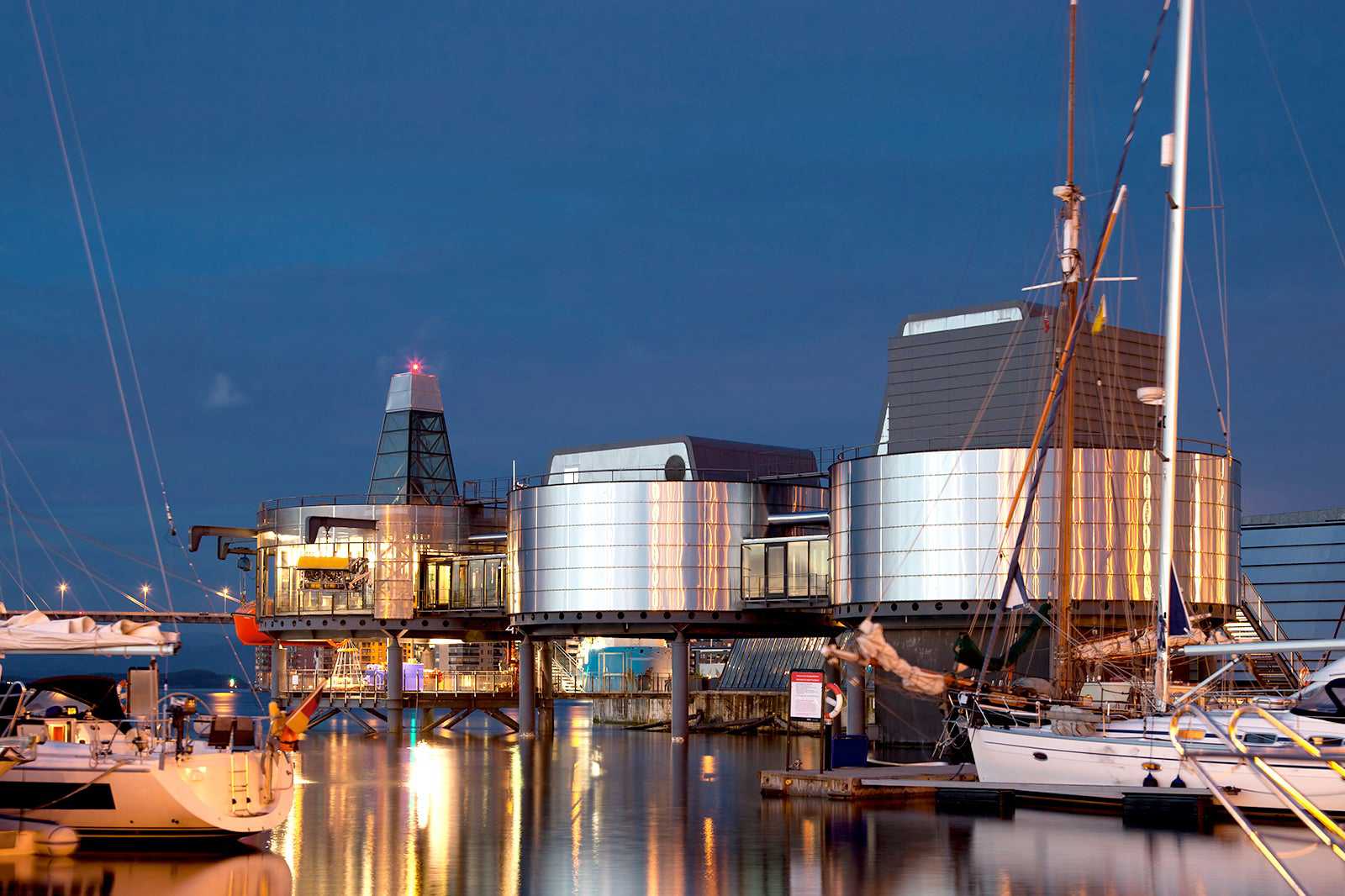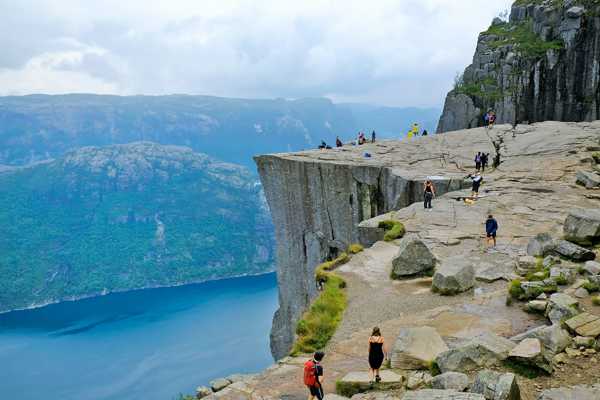Stavanger is just big enough for you to see the entire city in one day. Despite its small-town feel, Stavanger and the surrounding area have played a key role in eras of Norwegian history, from Norway's unification in the Viking Age to today's role as the country's "Oil City".
Long traditions and modern structures give this city a varied environment and a compact but buzzing center. And the choice of museums is no less impressive. These cover everything from the Iron Age to the oil age, indoor and outdoor museums, with traditional exhibitions in showcases and interactive communication.
- 1
Stavanger Cathedral
Norway's most preserved cathedral

- Budget
- Photo
Stavanger Cathedral is a beautiful and magnificent building located by Breiavatnet right above Vågen. The most monumental part is the Gothic choir flanked by two towers on the east side, with pointed roofs on the towers dating from the 18th century. The main entrance, however, is on the west side, on a much simpler façade that reveals that the church dates from before the Gothic period, closer to 1125 to be precise.
The overall shape of a three-part ship remains as it was originally built, probably by English craftsmen under the Bishop of Winchester. Winchester is also the hometown of Saint Swithun, Stavanger Cathedral's patron saint and a figure that you will see in many Stavanger street names and other places.
Location: Haakon VIIs gate 2, 4005 Stavanger, Norway
Phone: +47 51 84 04 00
Map - 2
Old Stavanger
White-painted wooden houses in historic Stavanger

- Budget
Old Stavanger is a district east and southeast of Vågen in central Stavanger, where several streets are completely preserved with their original cobblestones and small whitewashed wooden houses. The area is big and real-life enough for visitors to feel like they have having been transported back to another time, where everything was that much smaller and where people were more important than automobiles.
A lot of work has clearly been put into preserving and renovating, and green-fingered residents have added colorful plants and flowers to make the area extra pleasant.
Location: Old Stavanger, Stavanger, Norway
Map - 3
Norwegian Petroleum Museum
Learn about the country's key industry

- Families
The Norwegian Petroleum Museum deals with everything that has to do with "oil": exploration, production and use of oil and gas. The museum is located by the harbor in Stavanger city centre, and opened its 5,000 square meters of exhibition space in 1999. The focus of the museum is on interactivity, and many of the exhibits can be accessed using control panels with buttons and speakers.
Posters with text and illustrations provide detailed information about Norwegian oil production through the ages, but the most fascinating displays are without a doubt the many large models of machinery, constructions and vehicles used in the industry.
Location: Kjeringholmen 1a, 4006 Stavanger, Norway
Open: Monday–Saturday from 10 am to 4 pm, Sunday from 10 am to 6 pm
Phone: +47 51 93 93 00
Map - 4
Pulpit Rock
Experience one of the world's most spectacular views

- Couples
Pulpit Rock is one of a handful of scenes you'll always find in guidebooks on Norway. The square block that juts out over 600 meters above the Lysefjord is so majestic and iconic that you'll want to go there. As the hike from the carpark by the Pulpit Rock mountain lodge is relatively short and easy for experienced hikers, it goes without saying that it gets very crowded, especially in the summer months.
The ascent takes you through ordinary western forest terrain, so when the Lysefjord appears and the path moves out onto the mountain ledges over the fjord in the last few meters before Pulpit Rock itself, the view will take your breath away. Leave plenty of time to enjoy the view and to navigate the crowds on the edge of the cliff.
Location: Pulpit Rock, 4129 Songesand, Norway
Map - 5
Valberg Tower
The fire tower guarding the city

- Budget
- Photo
With its copper-green spire, special octagonal shape and prominent location on top of a hill in the heart of the city centre, Valberg Tower is Stavanger's foremost landmark alongside the cathedral.
It once served as a lookout tower for the city's guards, and played an important role in fire protection at a time when the buildings in Stavanger mostly consisted of wooden houses. Its role as a fire tower is long gone, and Valberg Tower is now a listed building without any function other than being a "good and characteristic feature of the cityscape", as per the description when the tower was listed. Its prominent location provides an excellent view of Stavanger.
Location: Valbergjet 4, 4006 Stavanger, Norway
Map - 6
Iron Age Farm
Go back 1,500 years

- Families
The Iron Age farm is a rebuilt farm from the migration period more than 1,500 years ago. It is built over the remains of old buildings from an abandoned farm, and consists of three houses with furniture and various equipment from the current era.
The houses also have a fireplace that is lit when the facility is open to the public. A guided tour lasts about half an hour, and sometimes includes performances /stories with hosts in full costume playing roles such as housewife, weaver or warrior. Alongside the farm is a visitors center with an exhibition, café and other facilities. The outdoor area is green and beautiful, with a view of the important agricultural area Jæren and the historic Hafrsfjord.
Location: Madlamarkveien 152, 4021 Stavanger, Norway
Open: Saturday from 11 am to 3 pm, Sunday from 11 am to 4 pm
Phone: +47 51 83 26 00
Map - 7
Cruise on the Lysefjord
Boat trips along steep mountain sides

- Families
- Photo
The Lysefjord is right by some of Norway's most famous and impressive rock formations, so the area is perfect for a leisurely boat trip. The Pulpit Rock plateau protrudes from the vertical cliffs near the entrance to the fjord, while Kjerag with the wedged boulder Kjeragbolten is on the south side, a good distance further inland.
Lysebotn in the heart of the fjord has developed into a tourist destination for extreme sports athletes and hikers, and is a turning point for the cruise. You can disembark here and go up to the aforementioned hiking destinations, but due to the steep and demanding terrain, these are reserved for those in good shape. The cruise is on a quiet electric boat, allowing you to enjoy the scenery to the fullest.
Location: Strandkaien, Stavanger, Norway
Phone: +47 51 89 52 70
Map - 8
Breiavatnet
Byparken's lake, a gateway between past and present

- Budget
- Photo
Breiavatnet is a small lake in the center of Stavanger. It emerged naturally, but backfilling and bricked edges along its banks now make it look like an artificial lake, fully integrated into the park. The lake has a lively fountain in the middle, and is home to many popular ducks and swans.
The lake is surrounded by a cityscape of contrasts: to the north stands one of Norway's oldest buildings, Stavanger Cathedral, a symbol of Stavanger's long history. And to the west are the skyline and the high-rises of the St. Olavs district, symbolizing the city's ambitions and recent growth.
Location: Breiavatnet, Stavanger, Norway
Map - 9
Stavanger Maritime Museum
An impressive museum collection

- Families
From a height of one hundred meters, Stavanger Maritime Museum towers above Vågen. The 150-year-old building houses exhibitions of natural history collections, church art and children's history. The science department displays certain types of fauna, with a focus on birds and insects. The collections lack certain documentation, but this doesn't impact on the visual effect of the exhibition in any way.
The section for children's history exhibits a large amount of toys, not least from the toy manufacturer Lærdal in Stavanger, which was Norway's largest toy factory at the time.
Location: Muségata 16, 4010 Stavanger, Norway
Open: Tuesday–Wednesday and Friday from 11 am to 3 pm, Thursday from 11 am to 7 pm, Saturday–Sunday from 11 am to 4 pm (closed on Mondays)
Phone: +47 51 84 27 00
Map - 10
Swords in the Mountain
Mega monument to commemorate the unification of Norway

- Budget
- Photo
In Hafrsfjorden near Stavanger, at the end of the ninth century, the final battle for Norway's unification was under Harald Hårfagre. To cut a long story short, Harald won, Norway was unified and that's how it's been ever since. The enormous bronze monument, Swords in the Mountain, was made by local artist Fritz Røed in 1983 to commemorate the event.
The sculpture consists of three vertical elements with the characteristic Viking sword shape, which gives the impression of having been plunged deep into the soil. In Norse times, sticking a sword in the ground was an act that marked a will for peace and an end to strife. The monument is also a symbol of peace and represents the unity of Norway.
Location: Møllebukta, 4044 Hafrsfjord, Norway
Map


















